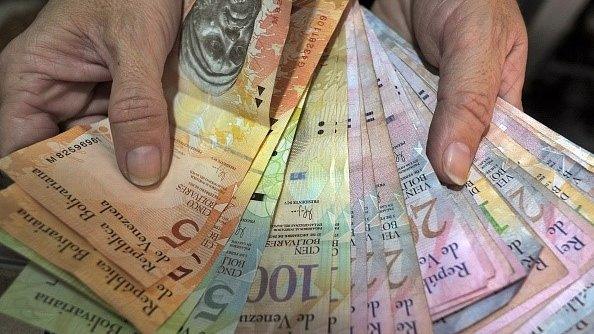Venezuela's black economic magic
- Published
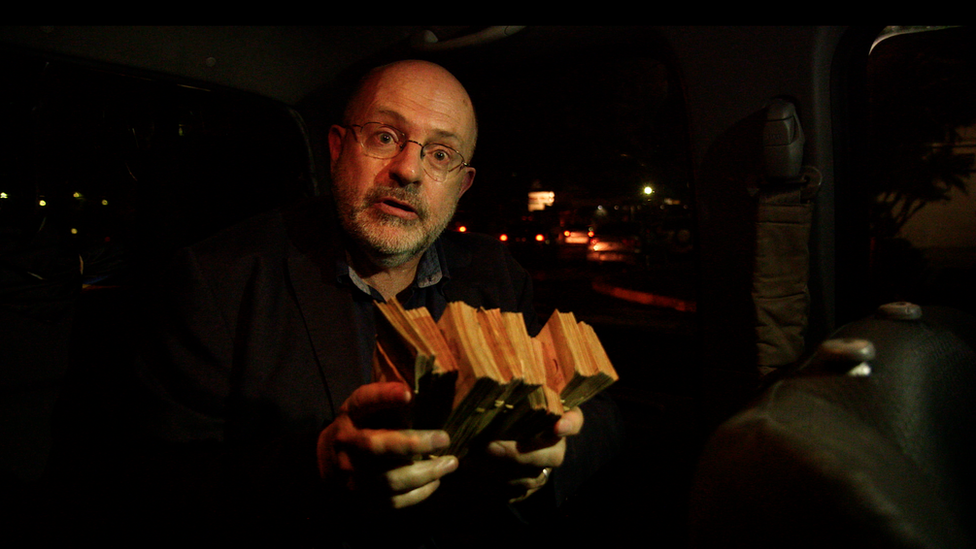
Sorcery is alive and well in Venezuela, once the richest country in South America, now an economic disaster. Hand over $100 and - hey presto! - you get a wad of notes the size of two house bricks: 100,000 Bolivars.
But that's an all-too-simple trick on the black market. Shopping for chicken, rice, toothpaste, soap, flour and toilet rolls has been turned into a vanishing act. The government's fixed prices for staples are at such low values shops lose money if they sell them - so they don't.
Pop-up queues appear when rumours swirl that a supermarket might have a batch of staples at the fixed price. That people in the country with the biggest oil reserves in the world queue for food is black magic indeed.
Four soldiers in flamboyant uniforms - black shakos, red feathers, gold brocade - guard the shaman responsible. Hugo Chavez lies in his tomb, a hero to his supporters, to his enemies the founder of a political cult. The mausoleum smacks of a shrine to a god suffering, like his country, from devaluation.
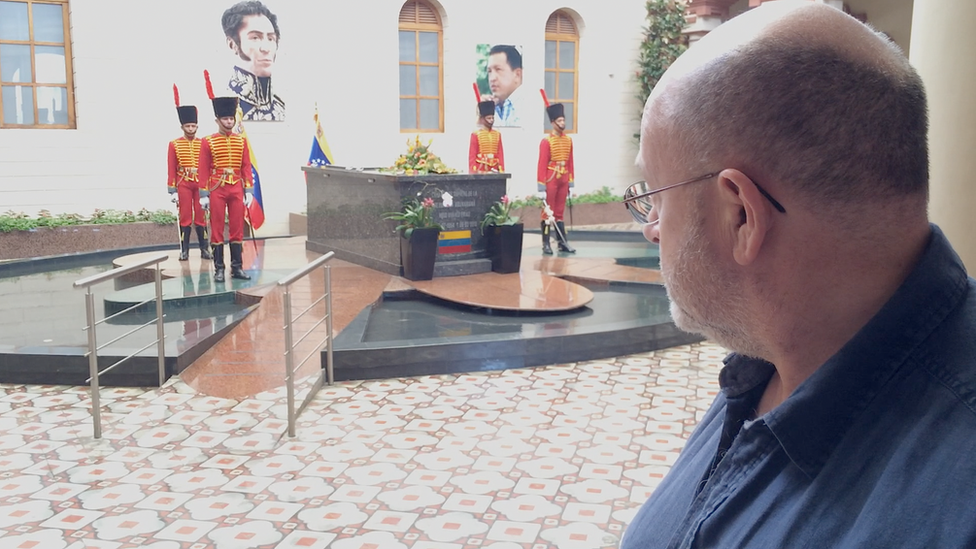
The guard of honour at the tomb of the late Hugo Chavez
Alive, Chavez - "El Comandante" - at least had charisma. The sorcerer's apprentice, President Nicolas Maduro, used to drive a bus. The bad news for Chavismo - the movement or cult Chavez created - is that wheels on the Maduro bus are falling off.
Statistics of any kind in Venezuela should be taken with a swig of the local rum - like beer, unavailable in a restaurant we visited in Caracas - but under Maduro the Bolivar is currently suffering from inflation of 141%, according to the government's own figures. The IMF predicts it will hit 720% later this year.
One number is that the country is $120 billion in the red, with oil revenue - responsible for nine-tenths of the state's export revenue - collapsing. Without the oil money, the country can't feed itself.
Fears over Zika
There are $10bn in debt payments due later this year and Venezuela can't borrow easily because the international market suspects it will default. Investors are already spooked because it has expropriated billions of dollars worth of foreign-owned companies.
Governing party MP Ramon Lobo told Newsnight: "The economic war has become even more vicious. It's an attack on the real economy. The oligarchs who still dominate food production are looking for a way to hang us by cutting production on purpose."
Murder numbers are notoriously dodgy in South American, but Caracas, by some estimates, suffered nearly 4,000 murders last year, making it one of the most dangerous cities in the world.
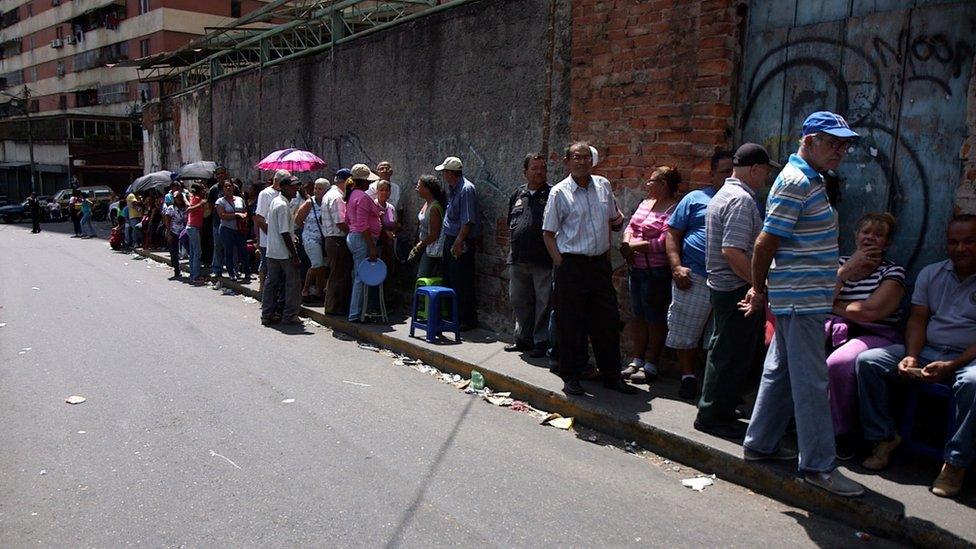
Queues for food and other goods are now to be seen in Caracas
And then there is the Zika plague - the mosquito-borne virus that some doctors believe is responsible for a spike in cases of creeping paralysis, Gillain-Barré syndrome, and, in Brazil, deformed babies. (The World Health Organisation has urged caution because the science on Zika is not yet proven.)
Maduro recently raised the number of suspected Zika cases from 4,700 to 5,221 with three deaths. Dr Jorge Luis Hernandez-Rojas, of the Chacao Health Agency in Caracas is part of a group of doctors who are close to the opposition. He told Newsnight: "We fear the true number of Zika cases is not 4,000 but 400,000." No-one knows for sure.
Political stalemate
Newsnight visited the neurology ward at the main hospital, home to patients suffering from a creeping paralysis, Gillain-Barré syndrome, linked to Zika. The ward was gloomy, with no air conditioning, conditions insanitary.
The patients we spoke to were grateful for their treatment but no doctor was available to talk to us. Windows were open - so the obvious danger of mosquitoes biting Zika patients and then infecting fresh victims in the hospital was ignored. The ward felt like a plague factory.
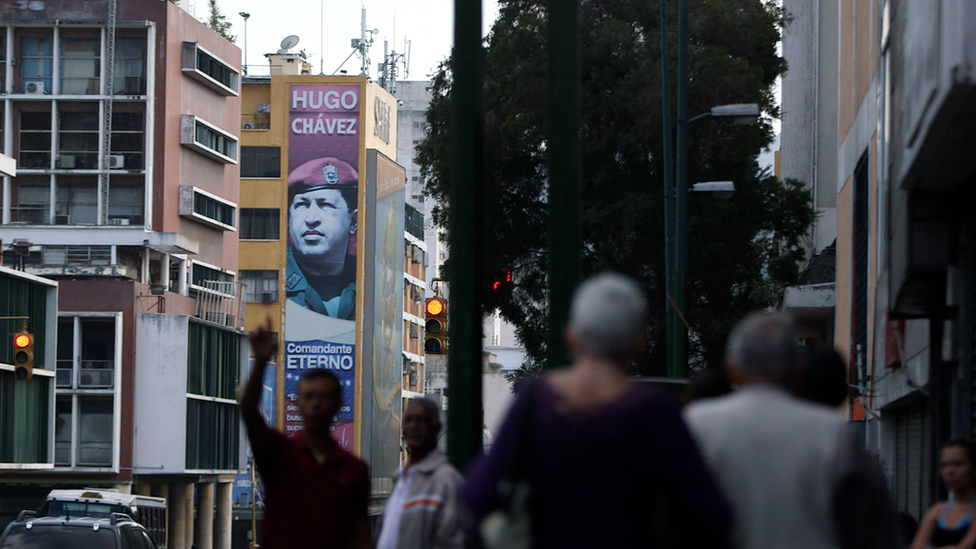
The country's late leader remains a divisive figure
The opposition won a big victory in December, taking control of the National Assembly for the first time in nearly two decades. One of the first things they did was to take down the Chavez banners that draped the building.
They also set out to challenge Maduro's emergency economic powers. The Supreme Court, stacked, says the opposition, with Chavistas, backed Maduro, so politics is stalemated.
The eyes of Hugo Chavez stare down at you from sites across the capital. But what they look down on is a nation gone to seed: grungy high-rise buildings, the concrete crumbling, stray dogs pecking at the rubbish, heavily armed police toting shotguns at checkpoints and traffic jams.
Petrol here is the cheapest in the world - our driver could fill up his tank for pennies - an absurdity that Maduro dare not address lest he trigger riots, like the "Caracazo" chaos in 1989 in which hundreds died.
Financial meltdown, political stalemate: it might not come to it but some people fear this could lead to violence and even a military coup.
John Sweeney, external's report aired on Newsnight on 1 February. You can catch up on iPlayer (UK only)
- Published7 January 2016
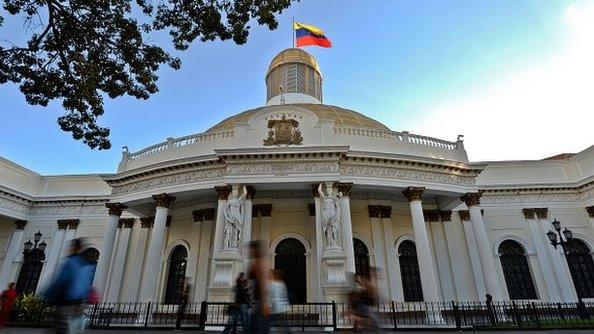
- Published12 February 2016
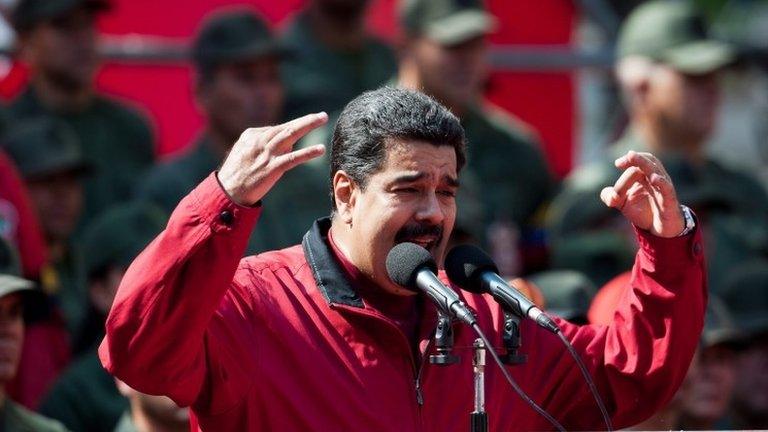
- Published7 December 2015
